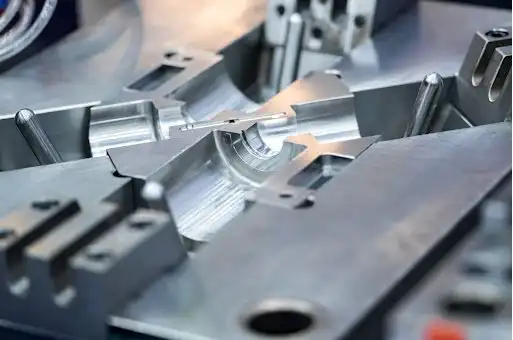
Knowledge
Advantages and Disadvantages of Cold Chamber Die Casting

Cold chamber die casting is a prominent manufacturing process used across various industries to create metal parts with high precision and quality. Unlike the hot chamber process, the cold chamber method involves injecting molten metal into a die that is separate from the injection chamber or cylinder, which does not come into direct contact with the molten metal. The process is known for its efficiency, enabling rapid production of large quantities of parts. However, it's not without its challenges and limitations.
In this article, we will delve into the intricacies of the cold chamber die casting process, exploring its advantages, disadvantages, and applications. We'll also examine real-world case studies to understand how this method is being utilized in cutting-edge manufacturing. Whether you're a professional in the field or simply curious about manufacturing technologies, this comprehensive guide offers valuable insights into cold chamber die casting.
Welcome to contact Vigor for more detailed information, call us at 029 81161513 or email us at info@castings-forging.com
Advantages of Cold Chamber Die Casting
1. High Casting Quality
- Precision and Accuracy: Cold chamber die casting is renowned for its ability to produce parts with tight tolerances and exact specifications. The controlled injection of molten metal into the die ensures that the final product adheres to the desired dimensions, making it suitable for applications where precision is paramount, such as in aerospace or medical devices.
- Surface Finish Quality: The process allows for a smooth and uniform surface finish, minimizing the need for post-processing or machining. This not only enhances the aesthetic appeal of the parts but also contributes to their functionality, especially in components where surface friction must be minimized.
- Structural Integrity: The rapid cooling and solidification of the metal in the die ensure that the parts have excellent structural integrity. This leads to components that are robust and resistant to stress, fatigue, and deformation, essential qualities in automotive and industrial applications.
2. Wide Range of Raw Materials
- Material Options and Flexibility: Unlike some other casting methods, cold chamber die casting can handle a wide variety of non-ferrous metal alloys, including those with higher melting points like aluminum and magnesium alloys. This flexibility opens up numerous design possibilities and allows manufacturers to choose the best material for specific applications.
- Material Properties and Benefits: The ability to use different materials means that parts can be optimized for specific properties such as strength, weight, corrosion resistance, or thermal conductivity. This customization is vital in industries like automotive, where weight reduction without compromising strength is a key goal.
- Environmental Considerations: Many of the materials used in cold chamber die casting are recyclable, contributing to a more sustainable manufacturing process. The efficient use of materials also minimizes waste, aligning with environmental best practices.
3. High Production Efficiency
- Speed and Scalability: The cold chamber die casting process is known for its rapid production capabilities. The quick cycle times make it suitable for large-scale production runs, meeting the demands of industries that require high volumes of consistent quality parts.
- Automation and Technology Integration: Modern cold chamber die casting machines are often integrated with automation and advanced monitoring systems. This technology enhances efficiency, reduces human error, and allows for more precise control over the casting process.
- Cost-Effectiveness in Large-Scale Production: While the initial setup costs may be high, the speed and efficiency of the process make it cost-effective for large-scale production. The ability to produce large quantities of parts with minimal waste and reduced labor costs contributes to the overall economic viability of the process.
In conclusion, the advantages of cold chamber die casting lie in its ability to produce high-quality, precise, and robust parts from a wide range of materials, efficiently and sustainably. Its adaptability and efficiency make it a preferred choice for various industries, reflecting its importance in modern manufacturing.
Disadvantages of Cold Chamber Die Casting
1. Low Product Complexity
- Limitations in Design and Geometry: While cold chamber die casting is known for its precision, it may struggle with highly complex geometries. Intricate designs with thin walls or undercuts can be challenging to produce, limiting their applicability in some specialized areas.
- Challenges in Producing Complex Parts: The process's nature may lead to difficulties in casting parts with multiple interconnected cavities or complex internal structures. This can result in defects or inconsistencies in the final product.
- Potential Solutions and Alternatives: Some of these challenges can be mitigated through careful design and engineering, utilizing simulation tools, or employing alternative manufacturing methods like investment casting for highly complex parts.
2. High Production Costs
- Initial Investment and Setup Costs: Cold chamber die casting requires significant upfront investment in specialized machinery and tooling. This can be a barrier for smaller manufacturers or those looking to produce limited quantities of a particular part.
- Operational and Maintenance Expenses: The process operates at high pressures and temperatures, leading to wear and tear on the machinery. Regular maintenance and potential replacement of parts can add to the ongoing operational costs.
- Comparison with Other Casting Methods: Depending on the specific requirements of a project, other casting methods like sand casting or gravity die casting might offer a more cost-effective solution, particularly for small-scale production or for parts with less stringent tolerance requirements.
Welcome to contact Vigor for more detailed information, call us at 029 81161513 or email us at info@castings-forging.com



